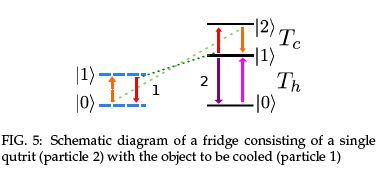As accepted in the semiconductor business, nature itself places limitations on small size, not engineers. The Bristol team, professor Noah Linden, professor Sandu Popescu and Paul Skrzypczyk, say in their arXiv paper there is no minimum size and wanted to seek out any fundamental dimensional limits to thermodynamic machines and designed what is arguably the smallest possible refrigerator - and it works quite well, almost to absolute zero. Did they ironically reach a new fundamental limit? No, just what has been found so far, they believe.
One of their model refrigerators is made from just three two-level quantum systems, qubits, and is completely self-contained, meaning it requires no external source of work, something that has never been achieved before.
For most of us, that is a disconnect right there. No refrigerator can work without a supply of energy, but they use two heat baths at differing temperatures. Two of the qubits make up the refrigerator – one in a hot heat bath, the other in a heat bath at “room temperature” while the third is the object to be cooled. In addition to their interaction with their local heat baths, the qubits interact with each other. As the hot qubit absorbs energy from its bath, it causes the tepid qubit to siphon energy from the third qubit, thus cooling it. Understand what quantum physicists mean by cooling - they mean lower energy.
But that's easy stuff, you could have found that part out in Scientific American. They can go even smaller, they say - getting rid of the third qubit and having only a single qutrit. Most people have heard of qubits but not qutrits so here is an analogy: Qubit is to bit (binary digit, 0 or 1) as qutrit is to trit (instead of base-2 like binary it is base 3 - so 0, 1 or 2). A trit is just over 1.5 bits of information but the benefit to a qutrit over qubits is it can exist in superpositions of the three basis states so a string of n qutrits is able to represent 3n different states simultaneously. Cool, huh?

Will it find its way into your home? Now it's back to engineering. Finding a system with the exact parameters in this model is impossible but once it's theoretical, it can become applied. Plus, the motivation behind the research was understanding fundamental limitations of Nature and not possible applications - pure basic science - though as high-technology devices get smaller, the smallest possible refrigerator may find a use. Now someone just has to design the world's smallest beer to fit into it.
Citation: Noah Linden, Sandu Popescu, Paul Skrzypczyk, 'How small can thermal machines be? The smallest possible refrigerator', arXiv:0908.2076v2 (in press at Physical Review Letters)





Comments